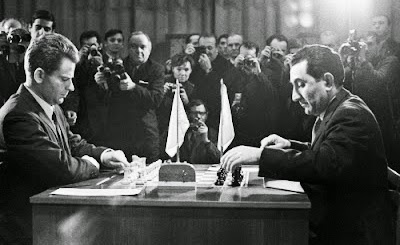After the customary Zonal Tournaments, the Interzonal tournament of the 1967 – 1969 World Championship Cycle took place in Sousse, Tunisia. 23 players battled for six places in the Candidates, since Boris Spassky (as a loser in the 1966 World Championship Match), and Mikhail Tal (as the loser in the final Candidates match in 1963-1966 cycle) had their spots reserved.
Over the course of the first ten rounds, the main pre-tournament favourite, Robert James Fischer, set up a furious pace, starting with seven wins and three draws. However, at this particular moment, he suddenly decided to withdraw from the tournament. You see, due to him and Reshevsky having religious feelings (Reshevsky was a Jew and Fischer a Seventh Day Evangelists), they couldn’t play on particular days. It presented a serious challenge for the organizers, who scheduled a couple of their games to be played on the free days. Reshevsky agreed, but Fischer being Fischer refused to play these games and was defaulted twice. After the second default, he travelled to Tunisia on the day of his game against Larsen. Not even USA ambassador was able to convince him to return and play. After his third default, he withdrew from the tournament and his previous results were annulled.
A lot has been written about Fischer’s decision. Personally, I agree with Kasparov’s observation that Fischer’s awareness of his inferiority to Spassky at a time was the main reason for such a behaviour:
„Fischer was a young man, already capable of great feats, he was ready for a real fight and could have gone at least as far as the final Candidates match, in which he would most probably have met Spassky. Stop – is this not the clue to Fischer’s behaviour in Sousse? For some, seemingly irrational reasons he withdraws from the tournament, but thanks to this he avoids a very dangerous match with Spassky, who was crushing everyone in turn at that time. Fischer was not yet the 1970-72 version of Fischer and he might well have faltered.
Not without reason did Petrosian write on the eve of his second match with Spassky (1969): It sometimes seems to me that Fischer did not start the Amsterdam Interzonal tournament in 1964 and withdrew from the event in Sousse because he was afraid of losing a match to one of the candidates. After all, then the halo of invincibility around „Bobby the genius“ would be greatly tarnished and the practical American would no longer be able to dictate good financial conditions from the organisers of those tournaments who wanted to see him in the list of participants.“
(Source: Garry Kasparov On My Great Predecessors, Part Four, Page 334)
In any case, after Fischer was gone, another Western player, Bent Larsen, shone and won the tournament a point and a half ahead of Korchnoi, Geller and Gligoric. Apart from these four, Lajos Portisch and Samuel Reshevsky qualified for the Candidates matches. The pairings were determined at the concluding banquet of the Interzonal tournament. The matches were played throughout 1968. After three very convincing victories (5.5-2.5 against Geller, 5.5-2.5 against Larsen and 6.5-3.5 against Korchnoi), Spassky repeated Smyslov’s feat from the 1954-1957 cycle and qualified for the World Championship final for the second time.
World Championship Final started on 12 April 1969 in Moscow. The time control was 2 hours and 30 minutes for 40 moves, followed by 1 hour for subsequent 16 moves. From the very start, it was obvious Spassky had learnt a lot from the previous match. This time, he played strictly the main lines with the Black pieces – Queen’s Gambit Declined and Tarrasch Defence. Although he began the match with a loss in the very first game, he regained the initiative rather quickly and with the wins in the fourth, fifth and eight games, he gained a commanding lead.
Petrosian, however, didn’t falter and managed to level the scores after winning the tenth and eleventh games. Still, in contrast to their 1966 match, Spassky was more psychologically mature and managed to endure such a blow. After a series of five draws, he won the 17th and 19th game and in the end, after 23 games, won the match with the 12.5 -10.5 score and became the tenth world champion.
Sources:
Chessgames: Sousse Interzonal 1967
Chessgames: Petrosian – Spassky 1969
Chesspedia: Petrosian – Spassky, 1969
Wikipedia: World Chess Championship 1969
Garry Kasparov On My Great Predecessors Part Three
Garry Kasparov On My Great Predecessors Part Four

